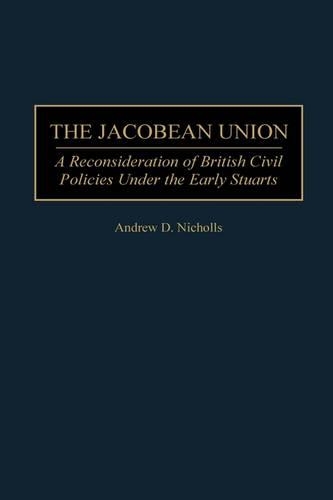
The Jacobean Union: A Reconsideration of British Civil Policies Under the Early Stuarts
(Hardback)
Publishing Details
The Jacobean Union: A Reconsideration of British Civil Policies Under the Early Stuarts
By (Author) Andrew Nicholls
Bloomsbury Publishing PLC
Praeger Publishers Inc
30th July 1999
United States
Classifications
Tertiary Education
Non Fiction
Genealogy, heraldry, names and honours
941.061
Physical Properties
Hardback
224
Description
Despite the failure of the Anglo-Scottish union negotiations in 1607, the early Stuart monarchs encouraged various civil policies aimed at fostering cooperation and unity among their three kingdoms. However, the opposition they faced from leading subjects frequently forced them to limit or retreat from British ventures. In arguing that the early Stuarts maintained a consistent yet uncomplicated policy of encouraging cooperation among their subjects, this work offers a new perspective on the role of multiple monarchy in the early modern British kingdoms. It has been generally accepted that James VI (James I of Britain) abandoned most efforts aimed at British unity following the failed Anglo-Scottish union negotiations of 1604-1607. This study asserts that James' desire for British unity and inter-kingdom cooperation should not be assessed within the context of that aborted political effort, but, instead, should be analyzed as a long-term project. Union designs predated his ascension to the English throne by some 20 years and continued up to his death in 1625. James was mindful of the possibilities for cooperation which were inherent in inter-kingdom defence policies, trade practices, colonial projects and foreign policy. Many of the assumptions that caused James to project encompassing policies were continued by Charles I, an unstudied element of British continuity between the two reigns. Ultimately, failure to emphasize the need for British unity in relation to a variety of civil policies would be an important factor in the fall of the Stuart monarchy during the British civil wars of the 1640s.
Reviews
Nicholls has woven together a complex story, telling it lucidly. Newcomers to the debate on "Britishness" will find this a valuable and thought-provoking introduction.-Albion Reviews of Books
Nicholls's approach to the political history of the early Stuart period provides a context for the reconsideration of a number of central issues...and will be useful for all British history collections.-Choice
The strength of the book lies in its comprehensive character...The main story line in this book, and its main value to historians, is the treatment of the successes and failures of the civil policies of James, whose British vision was much clearer, and his British policies more determined, than those of his son.-Scottish Historical Review
"Nicholls has woven together a complex story, telling it lucidly. Newcomers to the debate on "Britishness" will find this a valuable and thought-provoking introduction."-Albion Reviews of Books
"Nicholls's approach to the political history of the early Stuart period provides a context for the reconsideration of a number of central issues...and will be useful for all British history collections."-Choice
"The strength of the book lies in its comprehensive character...The main story line in this book, and its main value to historians, is the treatment of the successes and failures of the civil policies of James, whose British vision was much clearer, and his British policies more determined, than those of his son."-Scottish Historical Review
Author Bio
ANDREW D. NICHOLLS is Assistant Professor of History at Buffalo State College./e
